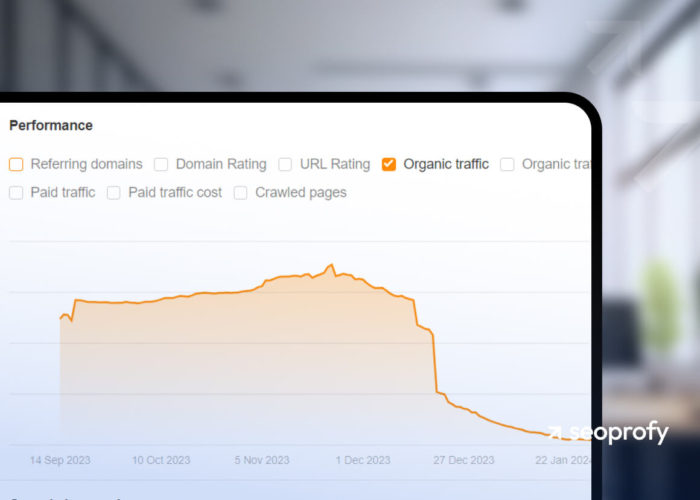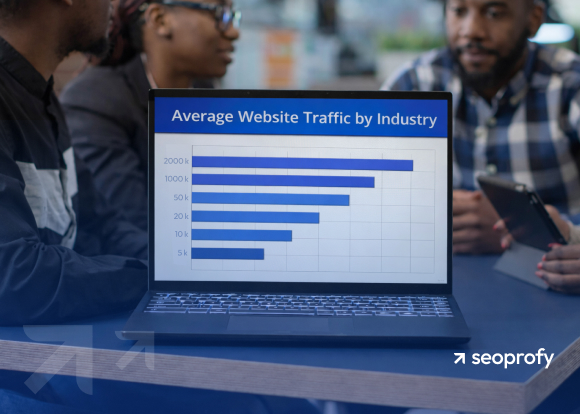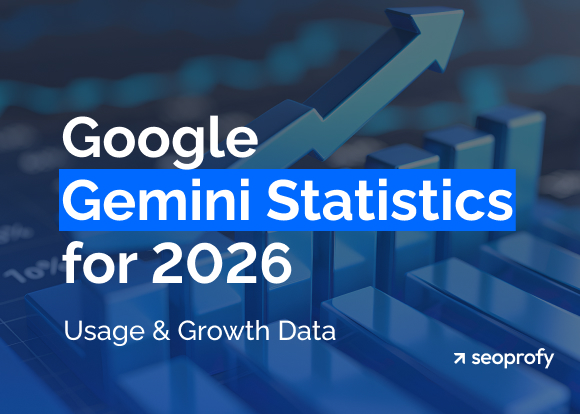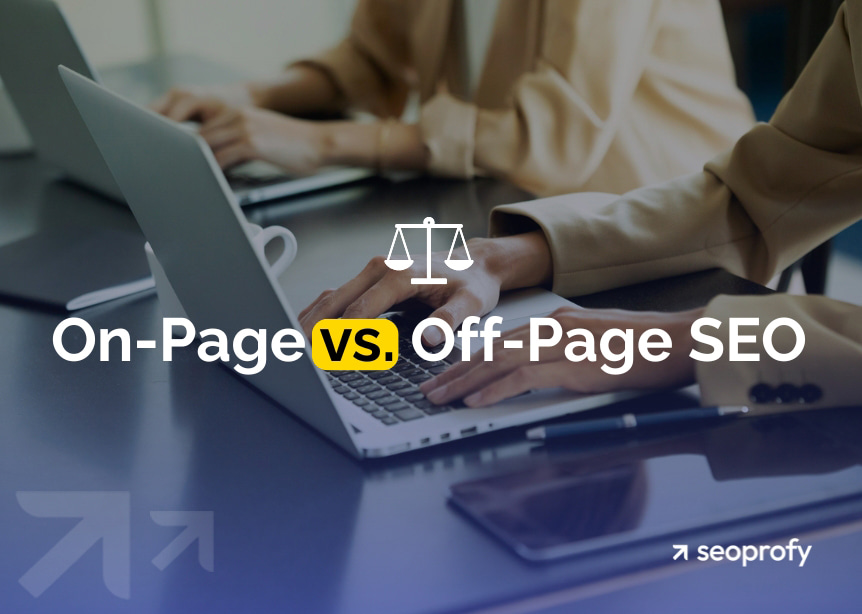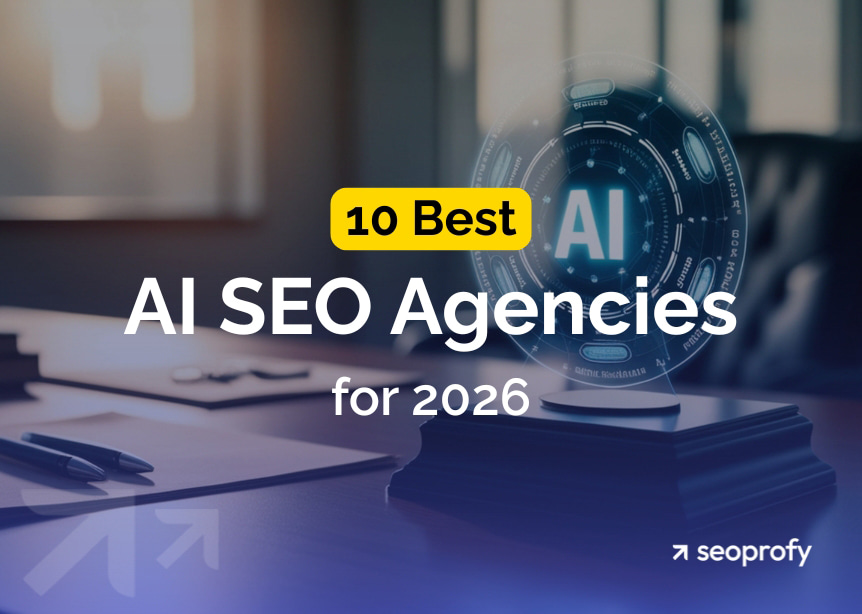Why is my SEO not working? If you find yourself asking this question, you might have invested in SEO activities like optimizing the website performance, keyword research or even earning backlinks from authoritative websites. But for some reason, your SEO efforts are not paying off.
Often, there is no simple answer. SEO is a complex and multifaceted field. It’s often a combination of factors causing your site not to rank well, for example:
- Implementing the wrong promotion strategy or having no strategy at all
- Not having sufficient SEO knowledge if you’re performing DIY SEO, which affects the quality of your content strategy and optimization techniques.
- Having high expectations that don’t match your capabilities or level of investment required.
- Doubting the necessity of SEO.
At SeoProfy, we have been in the battle trenches, taking sites from zero rankings and from penalties to ranking well again. In this article, we’ll share some insider reasons why your SEO may not be working, and how to get better results.
But do you know that we don’t take on any project if we’re not confident that we can deliver? That’s why the first question we ask is:
Does Your Business Really Need SEO?
Do you really need SEO? Don’t get it wrong. Search engine optimization is necessary as search is now the primary way many people find products and services. Even if you’re in an obscure niche, there is a chance that someone will search for something related to the business you do.
So, at the bare minimum, it’s great to have a website with a good site architecture and a few pages presenting your business. And of course, those need to have optimized meta descriptions and titles, and primary keywords featured.
But do you really need SEO in the context of allocating a budget for regular SEO initiatives? Turns out, there are instances when you might not need to invest in this digital marketing tool:
Is there sufficient demand for your product or service as reflected in search queries?
You don’t have to pour a budget into an SEO campaign targeting keywords that no one searches for. If you have a niche or new product/service that nobody is searching for online, then SEO may not be very effective for you.
For example, if you have a new unique technology and currently under 20 users are looking for it per month, then SEO may not be worth your time and money. You may be better off using other marketing channels, such as paid search, social media, PR campaigns, or influencer marketing, to create awareness and demand.
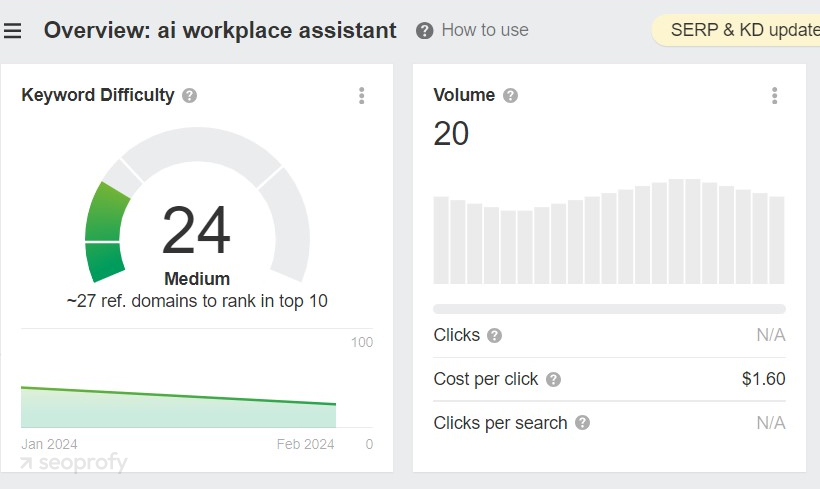
For instance, the following search phrase has a low monthly traffic volume. The SaaS business may find it faster, cheaper, and more accurate to promote their services through paid search:
Are You Looking to Get Traffic Fast?
On average, it takes months or even years to see the results of your SEO efforts, depending on your industry, competition, and goals. If you have an urgent need to generate sales or leads in a short period, then SEO may not be the best option for you. For example, if you’re promoting an event that will take place in a week or a seasonal product that will be out of demand in a few months, then SEO may not help you much.
Does Your Target Market Use Search Engines?
You may not need SEO if your audience doesn’t typically go on Google or Bing to find your services or information related to what you do. Additionally, there is no unknown demand beyond your predefined market segment, therefore, there is no need to spread awareness online.
There are many other scenarios where SEO may not be the best option for your business. However, you can consider speaking to an SEO specialist for a detailed assessment. You could also benefit from an early movers advantage if you’re the first business in your niche to invest in SEO.
10 Reasons Why SEO Doesn’t Work
So, why is your SEO not showing results? Well, there could be a few factors to consider:
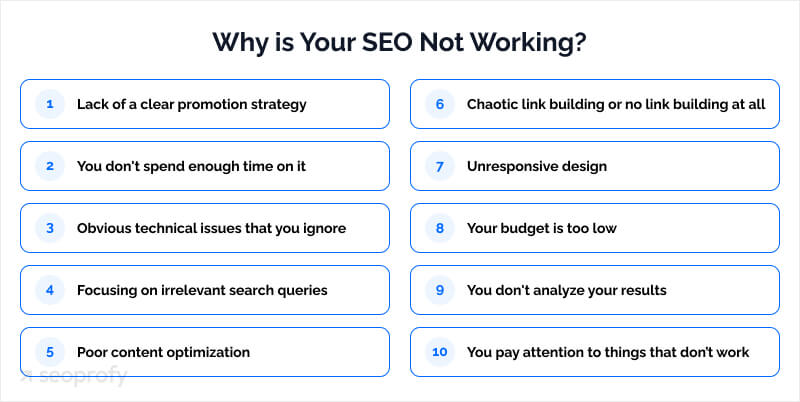
- Lack of a clear promotion strategy.
- You don’t spend enough time on it.
- Obvious technical issues that you ignore.
- Focusing on irrelevant search queries.
- Poor content optimization.
- Chaotic link building or no link building at all.
- Unresponsive design.
- Your budget is too low.
- You don’t analyze your results.
- You pay attention to things that don’t work.
Let’s elaborate on each point in detail:
Lack of a Clear Promotion Strategy
SEO requires a strategic approach that involves competitor research, your target audience, and your goals. Without a proper strategy, you may end up wasting resources on ineffective tactics that do not bring you any results.
The starting point of a successful SEO strategy is to conduct a thorough competitor analysis. This means researching what your competitors are doing online, what keywords they are ranking for, what types of backlinks they have, and what kind of content they are producing.
By doing this, you can gain valuable insights into:
- Defining KPIs for your project: You can benchmark your performance against your competitors and set realistic and measurable goals for your SEO campaign. For example, you can estimate how long it took your competitors to rank for certain keywords and how much traffic they are getting from them.
- Building a backlink strategy: You can identify the best sources of backlinks for your niche and the most effective ways to acquire them. For example, you can analyze what types of links your competitors have (e.g., guest posts, local listings, forums, etc.) and what anchors they use.
- Content strategy: Analyzing your competing sites helps you discover what types of content are most popular and engaging in your industry and what topics are in high demand. For example, you can see what types of pages your competitors have (e.g., blog posts, landing pages, product pages, etc.), what keywords they target, and what gets the most traffic and shares.
- Improving site structure and on-page optimization: Learning from your competitors’ best practices allows you to avoid their mistakes. For example, you can see how they structure their site (e.g., navigation, categories, internal linking, etc.), and how they use meta tags, headings, images, etc.
To illustrate the importance of having a clear promotion strategy, let’s look at an example of one of our competitors who started promoting their website back in 2016 and since then has built more than 8k links and has about 2.7k pages in search results.
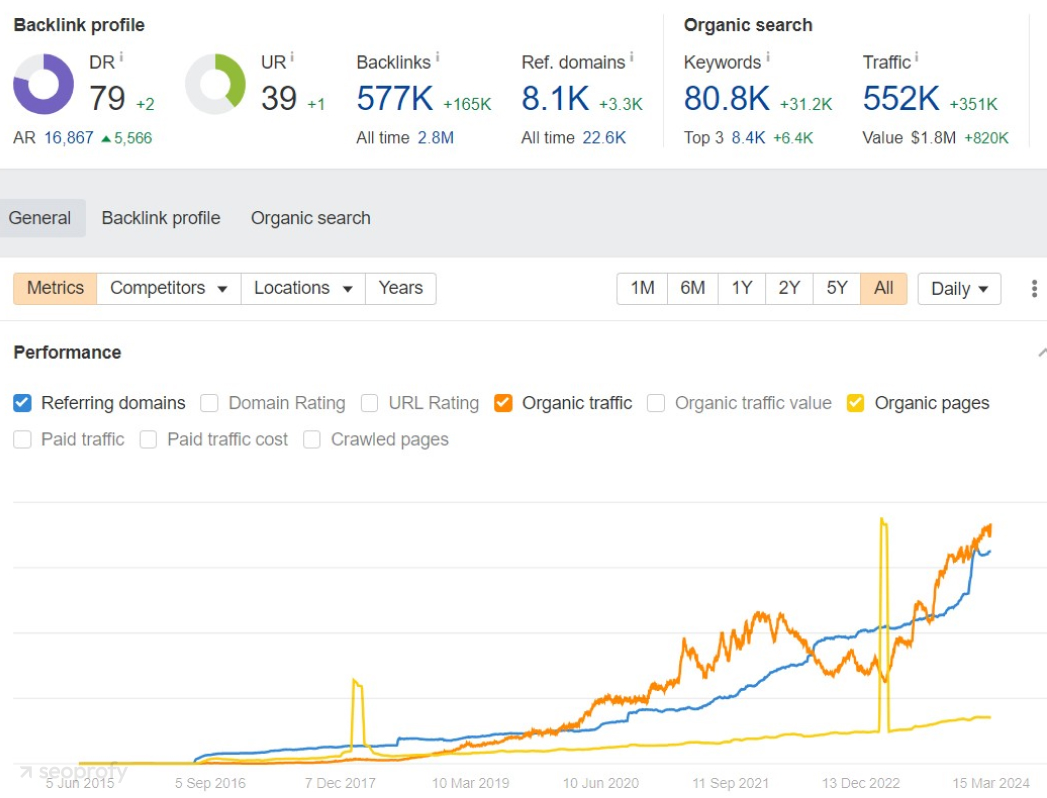
Not Enough Time and Effort
If you think that you can just create a website, optimize some meta tags, get a few backlinks, and then sit back and watch your traffic grow — you are mistaken. SEO is a long-term process that needs regular monitoring and analysis.
We are not saying that you have to work on SEO every day. But you have to work on it consistently, depending on the size and scope of your website and if the competition is high. For instance, if you have a small website with only 5 pages, you should dedicate at least 3-5 hours per month to SEO. But if you have a large e-commerce website with 10,000 products, you need to invest more time and resources.
At our company, we have a clear strategy for how many hours we need to spend on each project to achieve the desired results. For example, for e-commerce SEO, we allocate at least 60 hours per month of effective work per SEO specialist.
Technical Issues that Remain Ignored
One of the most common reasons why sites don’t make it to the top of search results is technical issues that go ignored. SEO has three main pillars: technical SEO, content (on-page SEO), and link building.
While content and link building require consistent effort, technical issues usually need to be fixed once (unless the site undergoes regular updates). Sometimes, you don’t even need to run technical SEO audits every month or every other quarter.
Some common hiccups that can affect your SEO performance are:
- Loading speed: Google considers loading speed as a ranking factor, so you need to optimize your site speed for both desktop and mobile devices.
- 3xx errors: These are redirection errors that can confuse both users and search engines. Too many redirects may slow down your site, waste crawl budget, and create duplicate content issues.
- 4xx errors: These client-side errors such as 404 (not found) or 410 (gone) errors pop up when a page or resource can’t be found. They can result in poor user experience, lost traffic, and lower rankings.
- Missing meta tags: Missing or poorly optimized meta tags can affect your click-through rates, relevance, and indexing accuracy.
- Crawling and indexing errors: They impact the ability of search engine crawlers to access, crawl, or index your web pages.
If you want to make a profit and rank higher than your competitors, you need to fix technical errors as soon as possible. If you delay, algorithm changes will affect your rankings. Keep an eye out for alerts on Google Search Console.
Focusing on Irrelevant Search Queries
A big part of SEO is understanding the search intent of queries your potential customers use. You don’t want to waste your time and resources creating pages that have no value or search demand. If you do, you may end up ranking for irrelevant or informational queries that don’t lead to conversions. This may be the reason why you are getting traffic but no sales.
To avoid this, you need to carefully choose your target keywords based on their search volume, popularity, and relevance to your niche. You also need to check the trends and interest around the topic to make sure you are not missing out on any opportunities.
A good way to do this is to use tools such as Ahrefs to discover new keywords and analyze their potential. Ahrefs can help you find out the percentage of daily searches that represent new and unique search terms, which can give you an edge over your competitors.
Poor Content Optimization
Poor content optimization can cause SEO improvements not to be seen. But it’s not only about not providing original and helpful content. Here are some factors that affect content optimization:
- The search intent: You need to understand what the searcher wants to know and provide a relevant answer in one piece. It makes no sense to try to fit everything on one page. For example, if someone searches for “What is content marketing”, they might want to learn what it is, how it works, or why it’s important. There is no need to include extraneous information about “How to promote your site on social media.”
- Content and page structures: There should be enough text to satisfy the user’s request. Not too much, not too little. You can always check how long your competitors’ content is. The design of the content also matters. If it’s a landing page, it should be structured as a landing page. You can use headings, subheadings, bullet points, images, and other elements to make your content easy to read and scan.
- Presence or density of keywords: Some experts note that the density of keywords no longer matters, but if you look at the content in highly competitive niches, it tends to be very high-quality from an SEO point of view. You need to include your target keywords in strategic places, such as the title, URL, meta description, headings, and body text. But don’t overdo it or you might risk keyword stuffing.
To ensure that your content has the right keywords and in the right frequency, you can use a tool like SurferSEO or our internal tool SearchAnalytics.ai to write content that matches the keyword density of the top-ranking pages.
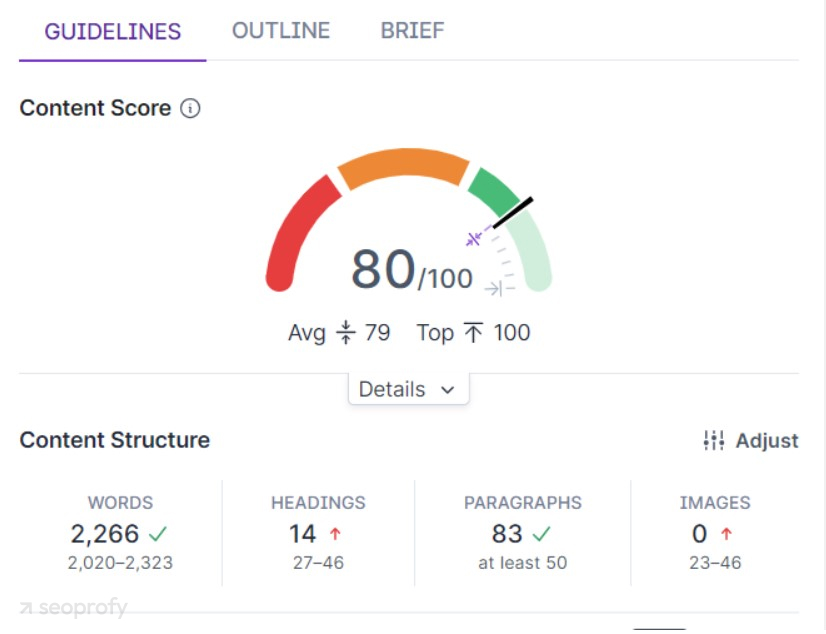
By the way, this content has been written with the help of SurferSEO and SearchAnalytics.ai 🙂
Chaotic or No Link Building
The third most important pillar of SEO is link building. Links will remain an important ranking factor as they form the backbone of how search engines evaluate and assign rankings to pages. However, it can also backfire if done incorrectly or chaotically resulting in SEO not working.
Low-quality links cause Google ranking drops, especially after Google’s core updates that penalize spammy or unnatural link practices. For example, we conducted a case study on a site in the educational niche where the ranking dropped after a Google update. We found that the site had a large number of irrelevant, low-quality, or over-optimized backlinks that triggered demotion.
To avoid such scenarios and ensure that your link building efforts are effective, you need to follow some SEO tips and best practices:
- Understand how many backlinks you need for each page: Analyze your competitors’ link profiles and identify the pages that are outranking your pages. Check how many links they have as a basis for the ideal number of quality backlinks you need.
- Anchor text strategy: You should use a variety of anchor texts that match the context and intent of the linking page and the linked page. Avoid using too many exact-match or keyword-rich anchor texts, as they can look spammy and unnatural to Google.
- Types of links: You should diversify your link sources and use different types of links, such as outreach links, links from main pages, reviews, listings, local directories, forums (Quora, Reddit), etc.
- The proportion of dofollow and nofollow links: It’s ideal to have a natural mix of dofollow and nofollow links, as dofollow links pass on link juice, while nofollow links can generate referral traffic and brand awareness.
- Link dynamic: Building links at a steady and consistent pace, without sudden spikes or drops, shows Google that your site is gaining popularity and trust over time, rather than gaming the system.
- Quality of referring domains: You should check the quality and relevance of the sites that link to you, as well as their link profiles. Remember to disavow any toxic or harmful links that you find in your backlink profile to avoid SEO penalties impacting ranking.
To perform a detailed analysis of a backlink profile, we use standard SEO tools, such as Ahrefs, Moz, or SEMrush, as well as our internal tool SearchAnalytics.ai, which combines all the necessary information in one place:
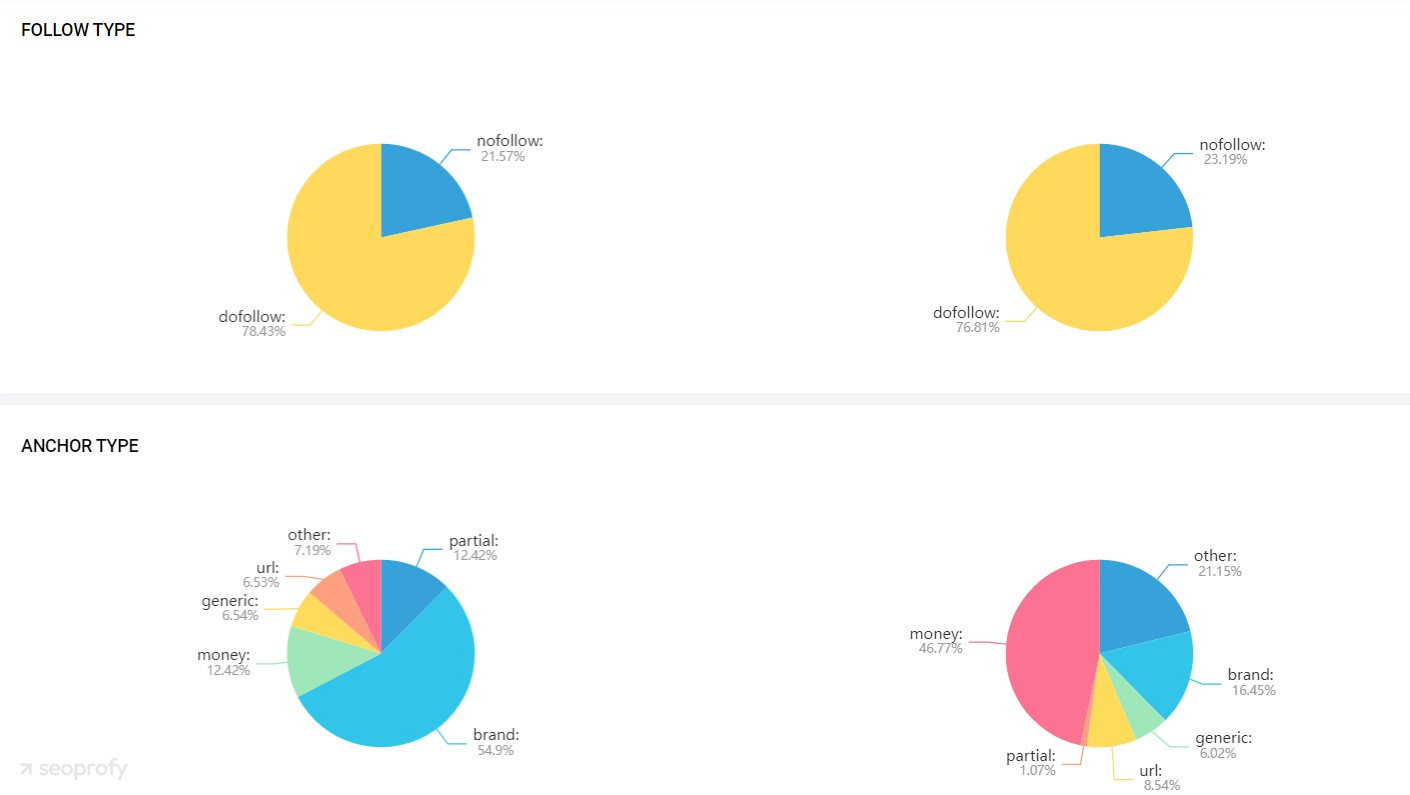
Unresponsive Design
Sites with unresponsive designs don’t adapt to different screen sizes and devices. This can cause a negative user experience, as visitors may have difficulty navigating, reading, or interacting with the website. Unresponsive design can also result in SEO strategies not working, as Google has taken a mobile-first approach due to the dominance of mobile searches.
If a website is unresponsive, it may experience reduced ranking and traffic. Moreover, unresponsive design can increase the bounce rate, which is the percentage of visitors who leave the website after viewing only one page. Responsive design is not only about aesthetics but also about usability and conversions.
Small Budget
While SEO can be considered “free” traffic, it does require a significant investment of time and expertise to achieve results. Having a small budget can limit the SEO tasks you can perform on your site. And this can be overshadowed by your competitors’ level of investment.
Evaluate your possibilities and how much your competitors are spending on SEO. Some keywords are very competitive and require a lot of resources to compete for them. For example, if you are undertaking casino SEO or SEO for law firms, you may face fierce competition from other websites that have larger budgets and more authority. If your budget is only three to four thousand dollars, but your competitors are spending six to ten thousand dollars or more every month, you may not be able to compete with them effectively.
But that does not mean that SEO will not be effective for you. It just means that you need to be realistic about your expectations and goals. You can focus on low-competitive keywords, which have less search volume but still generate qualified leads and conversions for your business.
No Monitoring and Analysis
If you’re wondering why is my SEO not working, it may be a lack of proper monitoring and analysis. Consider that SEO is a continuous process that requires constant monitoring and analysis as not every SEO strategy works for every website or niche.
You need to regularly review your strategies and plans and make adjustments based on the data and feedback. If you don’t track the changes and measure the results of your SEO efforts, you may be wasting your time and resources on strategies that do not work.
Our SEO company has a systematic approach to SEO monitoring and analysis. We review our strategies at the beginning of every campaign — every 3 months, then every 6 months. This way, we can identify what works and what doesn’t, and optimize our SEO campaigns accordingly.
Letting Myths Cloud Your Judgement
You need to be careful about falling for the many SEO myths that cloud your judgment and lead to SEO not working for you. Some of these myths are:
- E-E-A-T is everything: It’s important, but it’s not the only factor that matters.
- Link building is dead: It’s not, it’s still one of the most effective ways to boost your authority and rankings.
- SEO audits are enough: They’re not, you need to implement the recommendations and measure the results.
- Google updates are scary: They’re not, they’re opportunities to improve your site and align with user intent.
- Content doesn’t matter for SEO: It does, it’s important for ranking for targeted keywords and communicating with your audience.
- Technical errors are trivial: No. They can affect your site’s performance, usability, crawlability, and indexability.
These are just some of the SEO myths that you need to avoid but you get the idea.
What to Do to Make Your SEO Work
First of all, you need to realistically assess the situation from the very beginning. What are your current strengths and weaknesses? What are your competitors doing? What are the opportunities and threats in your niche? You must have a clear picture of where you stand and where you want to go.
Second, it’s vital to build the right strategy based on your assessment. You should define your target audience, keywords, content, and link-building tactics. Your business objectives and budget must also align with your SEO strategy.
Third, you should avoid falling for the traps of so-called SEO experts who only talk the talk but don’t walk the walk. Many people claim to know everything about SEO but have no proof of their results. They may offer you quick fixes, guarantees, or cheap services that are too good to be true.
Fourth, consider hiring a professional SEO agency if your SEO is not working. SEO is a complex and dynamic field that requires constant learning and adaptation. If you don’t have the time, skills, or resources to do it yourself, you may benefit from outsourcing it to experts who can handle it for you.
At SeoProfy, we ensure your SEO success by carefully vetting your project and determining if we can deliver results. Contact our team and get started with your SEO journey.

